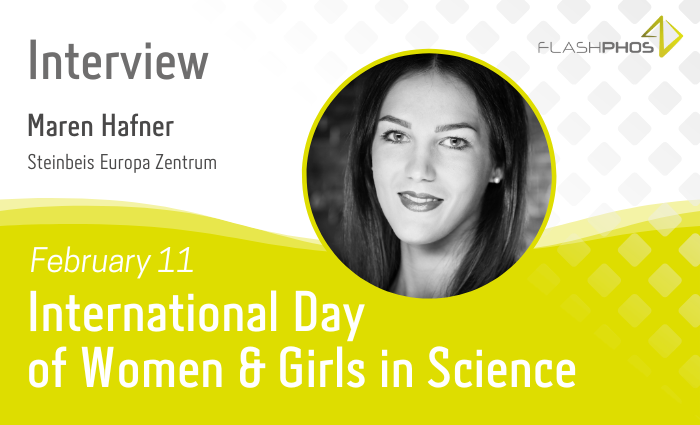To promote the full and equal access and participation of females in Science, Technology, Engineering, and Mathematics (STEM), the International Day of Women and Girls in Science takes place on 11 February every year. Within FlashPhos are many inspiring women who are contributing to the project’s progress. One of them is Communication and Dissemination Specialist Maren Hafner: At Steinbeis Europa Zentrum she works as a Project Consultant. The following interview gives an impression of Maren’s work, inspirations, and ambitions, offering a glimpse into her journey in STEM.
What is your academic background and why have you decided to pursue science, technology, engineering and mathematics (STEM) and more specifically your field of work?
I am a Project Consultant with a master’s degree in Biobased Products and Bioenergy. During my bachelor’s studies in Agricultural Sciences, I specialized in Plant Sciences and discovered my passion for renewable raw materials. I became particularly enthusiastic about the transition from a petroleum-based economy to a bioeconomy — one where fossil resources are replaced by diverse renewable raw materials.
What are you doing at Steinbeis Europa Zentrum and what is your role in FlashPhos?
I work as a Project Consultant, responsible for the communication and dissemination of the project’s progress to the general public and potential stakeholders. Both activities are an integral part of any EU-funded project.
Communication activities aim to inform the public about the projects research and its impact on societal challenges. These efforts reach different audiences, including media and the general public, using tools like newsletters, press releases, brochures, and social media. The language used is simple so everyone can understand the project’s approach.
Dissemination activities share the results of the projects research so others can use them, maximizing the impact of EU-funded projects. These activities focus on making results available to industry experts, professionals, and policymakers through scientific papers, policy briefs, training events, and online repositories. The language used is more technical and academic to ensure specialists can understand.
What motivates you to work in FlashPhos?
From a communication perspective, sewage sludge isn’t exactly a sexy topic. However, this is precisely where the challenge lies – and what drives my motivation. My goal is to make a topic that, at a first glance, may not seem appealing accessible and understandable to the public. I strive to explain why the FlashPhos approach is so important and to translate complex technical and scientific information into clear, easy-to-understand language.
Are there female role models that inspired you throughout your training or your career?
Madeleine Albright’s quote, “There’s a special place in hell for women who don’t help each other,” has deeply inspired me to support other women rather than view them as competitors. This statement serves as a powerful reminder that success is not a zero-sum game and that lifting others up strengthens us all. Historically, women have faced systemic barriers in many fields, including STEM, making it even more important to build networks of support rather than competition. Instead of seeing other women as rivals, I believe in mentorship, collaboration, and celebrating each other’s achievements. When women support one another, we create opportunities, foster innovation, and drive progress toward a more inclusive and equitable world. This mindset has shaped my approach to my career and personal growth, encouraging me to mentor, advocate, and uplift other women in their journeys, rather than being inspired by one specific role model.
What are your expectations and wishes for the future regarding the role of women in science? What advice can you give girls interested in a career in STEM?
My expectations and wishes for the future regarding the role of women in science are that women continue to break barriers, receive equal opportunities, and gain greater representation in leadership positions. I hope for a world where gender does not determine one’s success in STEM, and where women are (also financally) equally recognized for their contributions. I also wish for more inclusive environments in scientific fields, with strong mentorship and support networks that encourage diversity and innovation.

